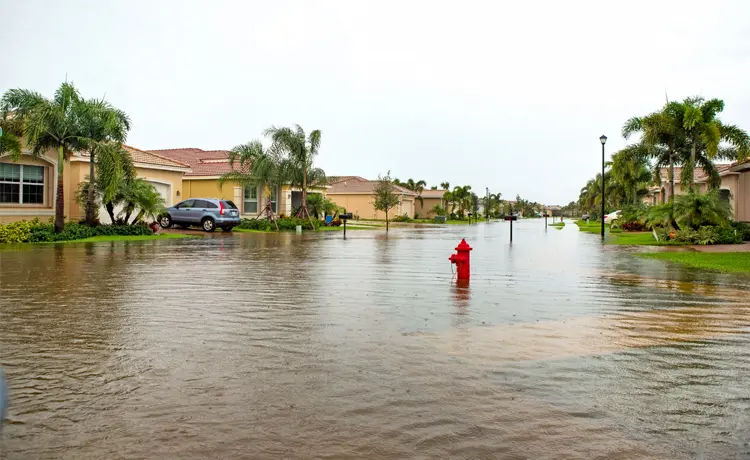Flooding in your neighborhood is a traumatic experience. It could mean costly damage to your home and a big disruption to your life. Depending on the severity of the flooding, it could also mean a long recovery period. Once the immediate danger has passed, people might be anxious to get into their homes to start cleaning up. This is understandable, but is your community aware of the hazards they could encounter during flood recovery?
 Shut off power at the main fuse box if there are sparks or damaged wires, or if the appliances are wet.
Shut off power at the main fuse box if there are sparks or damaged wires, or if the appliances are wet.
 Turn off the main water valve if pipes appear damaged.
Turn off the main water valve if pipes appear damaged.
 Carry a flashlight and a battery-operated or NOAA Weather radio for emergency updates.
Carry a flashlight and a battery-operated or NOAA Weather radio for emergency updates.
 Throw out all items that can't be washed/disinfected such as carpets, mattresses, upholstered furniture, etc.
Throw out all items that can't be washed/disinfected such as carpets, mattresses, upholstered furniture, etc.
 Scrub all hard surfaces, including floors, metal and wood furniture, appliances and plumbing fixtures.
Scrub all hard surfaces, including floors, metal and wood furniture, appliances and plumbing fixtures.
 Launder all contaminated clothing and outfits worn during cleanup in hot water with detergent.
Launder all contaminated clothing and outfits worn during cleanup in hot water with detergent.
 Take pictures of damages for insurance purposes.
Take pictures of damages for insurance purposes.
 Don't drink any water until local authorities have given the go-ahead.
Don't drink any water until local authorities have given the go-ahead.
 Don't flush the toilet until the sewage system has been checked.
Don't flush the toilet until the sewage system has been checked.
 Don't eat canned foods that are open, bulging or damaged, or any perishable foods that have been left at a temperature above 40°F for two or more hours.
Don't eat canned foods that are open, bulging or damaged, or any perishable foods that have been left at a temperature above 40°F for two or more hours.
 Don't let children or pets enter your home until the cleanup process is completed.
Don't let children or pets enter your home until the cleanup process is completed.
 Don't allow any cuts or sores to come into contact with floodwater. If redness or swelling occurs, seek medical care right away.
Don't allow any cuts or sores to come into contact with floodwater. If redness or swelling occurs, seek medical care right away.
 Don't operate a fuel-burning or gasoline-powered device inside, even with doors and windows open. This can create high levels of carbon monoxide, which can make you very ill. This includes pumps, generators, camping stoves, pressure washers and charcoal grills.
Don't operate a fuel-burning or gasoline-powered device inside, even with doors and windows open. This can create high levels of carbon monoxide, which can make you very ill. This includes pumps, generators, camping stoves, pressure washers and charcoal grills.
Making Your Way Home
First, make sure the OK has been given by authorities that it's safe to return home. While traveling, avoid lingering floodwaters, which might be contaminated, as well as downed power lines, washed-out roads, bridges and any moving water.Also important is to let family and friends know you're OK. The American Red Cross website offers a feature that allows people to communicate their "safe and well" status. With so much to worry about during flood recovery, it can be a relief to not have to worry about a loved one's safety.
Before Entering Your Home
Everything might look fine before setting foot inside, but go in cautiously, looking for possible hidden damage such as a weakened foundation or floor. Do a preliminary inspection outside to look for loose electrical wires or structural problems. Don't enter if floodwaters still surround the house or if you smell gas. After outside inspection, mentally prepare yourself for entering your home. It can be very distressing to see your treasured belongings damaged, which can take a toll on your mental state.Flood Recovery Dos
Flood Recovery Don'ts
All Clean? Think Again
You've restored the power and water, tossed out the water-damaged furniture and scrubbed the floors, so it's all clean! Or is it? Excess moisture in homes can lead to mold, which in turn can lead to severe health problems. Contact a professional to check your house for mold after a flood to keep everyone in good health. Possible signs of mold include discolored walls and/or ceiling and bad odors, which can range from a slight musty smell to a nasty stench.Tips for preventing mold growth:
- Open your windows and doors to let in fresh air and use fans for air circulation.
- Remove moisture with an air conditioner, heaters or dehumidifiers.
- Use a fungicide or other mildew prevention spray.
